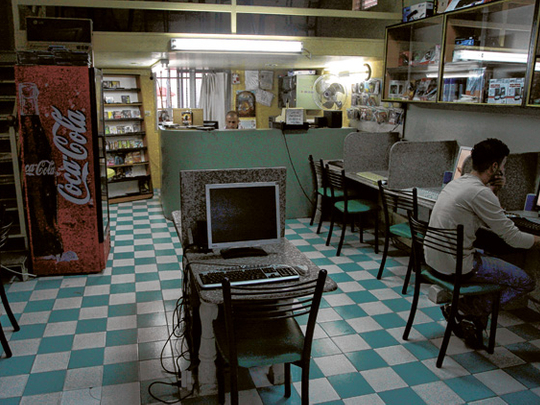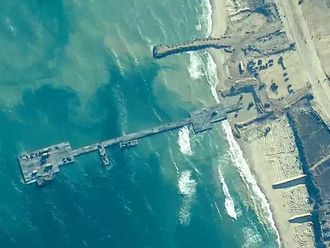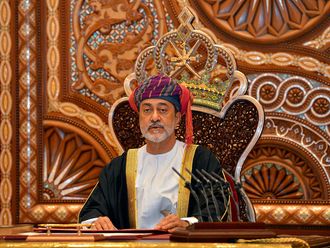
Qalqiliya, West Bank: A mysterious blogger who set off an uproar in the Arab world by claiming he was God and hurling insults at the Prophet Mohammad (PBUH) is now behind bars, caught in a sting that used Facebook to track him down.
The case of the unlikely apostate, a shy barber from this backwater West Bank town, is highlighting the limits of tolerance in the Western-backed Palestinian National Authority, and illustrating a new trend by authorities in the Arab world to mine social media for evidence.
Residents of Qalqiliya say they had no idea that Walid Hussain, the 26-year-old son of a Muslim scholar, was leading a double life.
Known as a quiet man who prayed with his family each Friday and spent his evenings working in his father's barbershop, Hussain was secretly posting anti-religion rants on the internet during his free time.
Family criticism
Now, he faces a potential life prison sentence on heresy charges for "insulting the divine essence." Many in this conservative town say he should be killed for renouncing Islam, and even family members say he should remain behind bars for life.
"He should be burned to death," said Abdul Latif Dahoud, a 35-year-old Qalqiliya resident. The execution should take place in public "to be an example to others," he added.
Over several years, Hussain is suspected of posting arguments in favour of atheism on English and Arabic blogs, where he described the God of Islam as having the attributes of a "primitive Bedouin." He called Islam a "blind faith that grows and takes over people's minds where there is irrationality and ignorance."
If that wasn't enough, he is also suspected of creating three Facebook groups in which he sarcastically declared himself God and ordered his followers, among other things, to smoke marijuana in verses that spoof the Quran. At its peak, Hussain's Arabic-language blog had more than 70,000 visitors, overwhelmingly from Arab countries.
His Facebook groups elicited hundreds of angry comments, detailed death threats and the formation of more than a dozen Facebook groups against him, including once called "Fight the blasphemer who said ‘I am God."'
The outburst of anger reflects the feeling in the Muslim world that their faith is under mounting attack by the West. This sensitivity has periodically turned violent, such as the street protests that erupted in 2005 after cartoons mocking the Prophet Mohammad (PBUH) were published in Denmark or after Pope Benedict XVI suggested the Prophet Mohammad (PBUH) was evil the following year. The pope later retracted his comment.
Hussain is the first to be arrested in the West Bank for his religious views, said Tayseer Tamimi, the former chief Islamic judge in the area.
The Western-backed Palestinian National Authority is among the more religiously liberal Arab governments in the region. It is dominated by secular elites and has frequently cracked down on hardline Muslims and activists connected to its conservative Islamic rival, Hamas.
Public profile
Hussain's high public profile and prickly style, however, left authorities no choice but to take action.
Hussain used a fake name on his English and Arabic-language blogs and Facebook pages. After his mother discovered articles on atheism on his computer, she cancelled his internet connection in hopes that he would change his mind.
Instead, he began going to an internet cafe, a move that turned out to be a costly mistake. The owner, Ahmad Abu Asal, said the blogger aroused suspicion by spending up to seven hours a day in a corner booth. After several months, a cafe worker supplied captured snapshots of his Facebook pages to Palestinian intelligence officials.
Officials monitored him for several weeks and then arrested him on October 31 as he sat in the cafe, said Abu Asal.
Hussain's family has been devastated by the arrest. On a recent day, his father stood sadly in the family barber shop, cluttered with colourful towels and posters of men in outdated haircuts. He requested that a reporter not write about his son to avoid being publicly shamed.
Two cousins attributed the writings to depression, saying Hussain was desperate to find better work. Requesting anonymity because of the shame the incident, they said Husain's mother wants him to remain in prison for life _ both to restore the family's honour and to protect him from vigilantes.
The case is the second high-profile arrest in the West Bank connected to Facebook activity. In late September, a reporter for a news station sympathetic to Hamas was arrested and detained for more than a month after he was tagged in a Facebook image that insulted the Palestinian president.
Gaza's Hamas rulers also stalk Facebook pages for suspected dissenters, said Palestinian rights activist Mustafa Ebrahim.
Do you think social media sites should be monitored more closely? Should the administrators be required to remove slanderous content once it has been reported?












